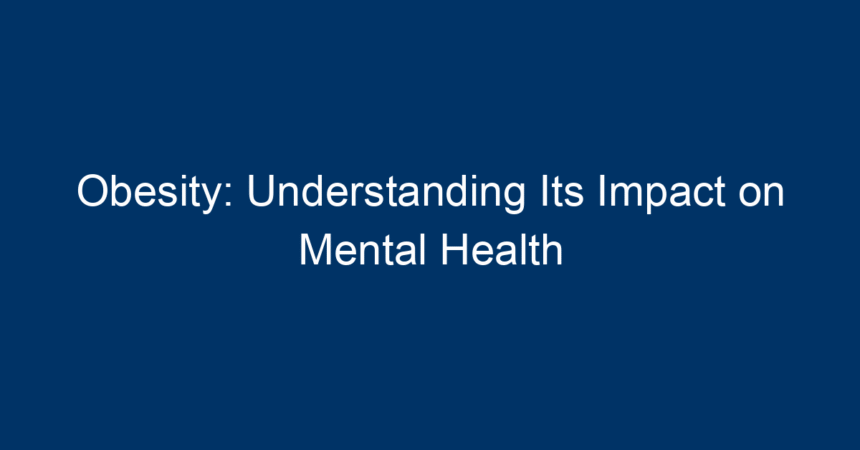Introduction
Obesity is a complex and multifaceted health condition characterized by excessive body fat accumulation, which significantly increases the risk of various health issues, including heart disease, diabetes, and certain cancers. However, its impact extends beyond physical health; obesity has profound effects on mental health as well. Understanding the intricate relationship between obesity and mental well-being is essential for comprehensive health care that addresses both the body and mind.
Numerous studies reveal a startling correlation between obesity and mental health disorders, such as anxiety and depression. This article aims to delve into the nuances of this relationship, exploring how obesity affects mental health, the psychological challenges faced by those living with obesity, and effective strategies for promoting both physical and mental well-being.
The Link Between Obesity and Mental Health
1. Understanding the Relationship
The relationship between obesity and mental health is bidirectional. Individuals with obesity often report higher levels of anxiety, depression, and low self-esteem. Conversely, mental health disorders can contribute to unhealthy lifestyle choices, including overeating and physical inactivity, leading to weight gain.
Research shows that biochemical changes in the brain that accompany obesity can alter mood and cognitive functions. Moreover, societal stigma and discrimination against individuals with obesity exacerbate feelings of isolation, depression, and anxiety, creating a vicious cycle that is difficult to break.
2. Societal Stigma and Its Effects
Societal attitudes toward obesity profoundly influence mental health. The stigma surrounding obesity can lead to social isolation, bullying, and discrimination, significantly impacting an individual’s self-esteem and self-worth. People with obesity often face negative stereotypes, which can lead to:
- Social Rejection: Individuals with obesity may find themselves excluded from social activities, leading to feelings of loneliness and social anxiety.
- Employability Issues: Discrimination in workplaces can result in job insecurity and limited career advancement opportunities, contributing to stress and anxiety.
- Body Image Issues: Constant societal pressure to conform to unrealistic body standards affects how individuals perceive themselves, often leading to disordered eating habits and mental health concerns.
Psychological Effects of Obesity
1. Depression
Studies indicate a strong link between obesity and depression. The chronic stress of managing a stigmatized condition, coupled with the physiological effects of obesity, can intensify feelings of hopelessness. People with obesity are more likely to face barriers in accessing mental health care, perpetuating the cycle of poor mental health.
2. Anxiety Disorders
The anxiety associated with obesity can stem from fear of judgment, weight-related teasing, or the constant pressure to lose weight. Heightened anxiety levels can lead to emotional eating, further complicating weight management efforts.
3. Low Self-Esteem and Body Dysmorphic Disorders
Many individuals with obesity struggle with low self-esteem, often comparing themselves unfavorably to societal standards. This can lead to body dysmorphic disorders, characterized by an obsessive focus on perceived flaws in appearance. Such conditions can hinder daily functioning and lead to severe mental distress.
Coping Mechanisms and Strategies
1. Psychological Support and Therapy
Engaging in therapy can significantly enhance mental well-being. Cognitive Behavioral Therapy (CBT) is particularly effective for individuals with obesity. It helps in:
- Identifying and changing negative thought patterns.
- Developing healthy coping strategies.
- Addressing emotional eating habits.
2. Building Support Networks
Creating a network of supportive relationships can foster a sense of belonging and help mitigate feelings of isolation. Consider:
- Joining support groups specifically focused on weight management and mental health.
- Engaging with family and friends for emotional support.
3. Mindfulness and Stress Reduction Techniques
Incorporating mindfulness practices, such as meditation and yoga, can benefit both mental and physical health. These practices help reduce stress, improve mood, and promote a healthier relationship with food.
4. Physical Activity and Nutrition
Regular physical activity is essential not just for managing obesity but also for enhancing mental health. Exercise releases endorphins, natural mood lifters that can alleviate symptoms of depression and anxiety. Furthermore, maintaining a balanced diet rich in whole foods can improve overall well-being.
The Role of Healthcare Providers
Healthcare providers play a crucial role in addressing obesity and its mental health implications. A holistic approach that includes both physical and mental health assessments can help create personalized treatment plans. Key strategies include:
- Screening for Mental Health Disorders: Regular assessments can help identify individuals who may benefit from psychological support alongside obesity management.
- Integrating Care: Collaborating with mental health professionals ensures comprehensive support for patients struggling with both physical and mental health issues.
Conclusion: Actionable Insights for a Healthier Future
Understanding the impact of obesity on mental health is vital to fostering a healthier society. Here are actionable insights to promote well-being for those affected by obesity:
- Seek Professional Help: Don’t hesitate to reach out to healthcare providers for support with both obesity and mental health concerns.
- Build a Supportive Community: Surround yourself with encouraging friends and family who will uplift and motivate you.
- Implement Healthy Habits: Focus on gradual lifestyle changes rather than drastic diets. Incorporate regular exercise and balanced nutrition into your daily routine.
- Practice Mindfulness: Commit to daily mindfulness practices to manage stress and improve emotional well-being.
- Advocate for Change: Engage in initiatives that challenge societal stigmas related to obesity. Promoting awareness can help foster an inclusive environment for everyone.
By taking these steps, individuals can work towards improving their mental and physical health, breaking the cycle of obesity and its psychological burdens. Remember, health is a journey, and every step counts in nurturing both body and mind.
This approach provides a comprehensive understanding of obesity’s impact on mental health, offering a blend of emotional and practical insights. With an emphasis on actionable strategies and resources, readers are equipped to take constructive steps toward better health outcomes.




